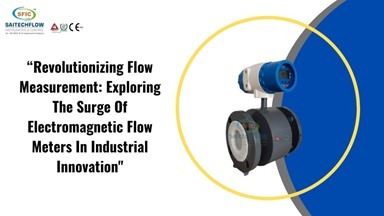Revolutionizing Flow Measurement: Exploring The Surge Of Electromagnetic Flow Meters In Industrial Innovation

Electromagnetic Flow Meters stand as one of the most widely used devices in industrial and commercial applications for measuring the flow rate of conductive liquids. Renowned for their accuracy and reliability, these instruments operate on the principle of Faraday's law of electromagnetic induction. In this blog, we'll delve into the working principles, advantages, disadvantages, limitations, and practical usage of electromagnetic flow meters.
Working Principle of Electromagnetic Flow Meters:
Electromagnetic Flow Meters operate based on the principle of Faraday's law of electromagnetic induction. When a conductive liquid flows through a magnetic field created by the flow meter, it generates a voltage proportional to the velocity of the liquid. The meter's electrodes detect this induced voltage, enabling the calculation of the liquid's flow rate.
Limitations of Electromagnetic Flow Meters:
1. Conductivity Requirement: Electromagnetic Flow Meters work efficiently only with conductive liquids. Non-conductive or low-conductivity fluids can pose challenges.
2. Pipe Size and Installation: Larger pipe sizes may require specially designed or customized Electromagnetic Flow Meters. Additionally, proper installation is crucial for accurate readings, which might be challenging in some scenarios.
3. Fluid Characteristics: Abrasive or corrosive liquids can affect the sensor's longevity and accuracy.
Advantages of Electromagnetic Flow Meters:
1. Accuracy: Known for their high accuracy, Electromagnetic Flow Meters provide reliable measurements across various flow rates.
2. Low Pressure Drop: Electromagnetic Flow Meters don’t obstruct the flow significantly, resulting in minimal pressure loss.
3. Wide Range of Applications: Suitable for various industries and liquid types, including wastewater, slurries, acids, and more.
4. Minimal Maintenance: With no moving parts, these meters require less maintenance compared to other flow measurement devices.
Disadvantages of Electromagnetic Flow Meters:
1. Installation Requirements: Proper grounding and pipe material are necessary for optimal functioning, making installation more complex.
2. Power Dependency: Continuous power supply is essential for Electromagnetic Flow Meters to operate, which can be a drawback in certain situations.
3. Cost: Electromagnetic Flow Meters can be more expensive initially compared to some other flow measurement methods.
How to Use Electromagnetic Flow Meters:
1. Installation: Install the meter in a section of the pipeline that meets specified requirements regarding straight run lengths, pipe material, and grounding.
2. Configuration: Calibrate the meter according to the manufacturer's instructions, considering factors like pipe size, fluid conductivity, and temperature.
3. Maintenance: Regularly inspect the meter for any buildup or damage. Follow the manufacturer's guidelines for maintenance and troubleshooting.
In conclusion, electromagnetic flow meters offer a reliable and accurate solution for measuring the flow of conductive liquids in various industries. While they come with certain limitations and installation requirements, their accuracy, minimal maintenance needs, and versatility make them a popular choice for flow measurement applications. Understanding their principles and proper usage is crucial to maximizing their efficiency and accuracy.
Saitechflow Instruments & Control is the best Electromagnetic flow Meters supplier, Manufacturer, Wholesaler in Pune, Mumbai, Maharashtra, India, Delhi, Kolkata, Chennai, Bangalore, Hyderabad , Ahmedabad, Surat, Kanpur, Jodhpur, Lucknow, Gwalior, Aurangabad, Raipur, Jamshedpur, Vijaywada, Haridwar, Odisha, Tamilnadu.
For electromagnetic flow meters, reach out to Saitechflow Instruments & Control today.



